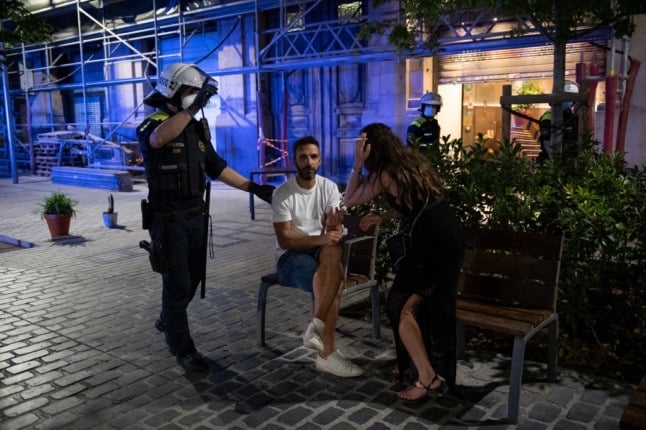A court in Catalonia approved the regional government’s request to extend the nightly curfew between 1:00 am and 6:00 am in 163 municipalities including Barcelona and popular beach resorts like Sitges and Salou.
The measure was imposed in the northwestern region bordering France in mid-July and this is the second time that it is extended.
Catalonia has Spain’s highest Covid-19 incidence rate. Before imposing the curfew, the region had instituted other virus restrictions such as limiting gatherings in public and private to 10 people.
The surge in infections has put pressure on Catalonia’s hospitals, with 45 percent of the region’s hospital beds occupied by Covid-19 patients, compared to 17 percent nationally.
Several other regions, including Andalusia in the south and the Balearic Islands in the Mediterranean, have also moved recently to reimpose limits on nightlife to fight a rise in infections driven by the highly contagious Delta variant of the virus.
Spain’s infection rate per 100,000 population over 14 days stabilised on Wednesday at nearly 700, a level about five times higher than it was a month ago. In hard-hit Catalonia it stands above 1,000.
“We have started to see a certain stabilisation in the infection curve,” Prime Minister Pedro Sanchez said Thursday.
Spain’s vaccination rollout has gathered speed and the country has one of Europe’s highest Covid-19 immunisation rates, with 66 per cent of its population having had at least one dose.
READ ALSO: Spain’s fifth Covid wave – What are the new restrictions in each region this summer?
The 163 municipalities that will have a nighttime curfew until further notice are the following:
ABRERA
ALCOVER
ALELLA
ALPICAT
AMPOSTA
ARENYS DE MAR
ARENYS DE MUNT
ARGENTONA
BADALONA
BADIA DEL VALLÈS
BALAGUER
BARBERÀ DEL VALLÈS
BARCELONA
BEGUES
BIGUES I RIELLS
BLANES
CABRERA DE MAR
CABRILS
CALDES DE MONTBUI
CALDES D’ESTRAC
CALELLA
CALONGE I SANT ANTONI
CAMBRILS
CANET DE MAR
CANOVELLES
CAPELLADES
CARDEDEU
CASSÀ DE LA SELVA
CASTELLAR DEL VALLÈS
CASTELLBISBAL
CASTELLDEFELS
CASTELL-PLATJA D’ARO
CELRÀ
CERDANYOLA DEL VALLÈS
CERVELLÓ
CORBERA DE LLOBREGAT
CORNELLÀ DE LLOBREGAT
CUBELLES
CUNIT
DOSRIUS
EL MASNOU
EL PAPIOL
EL PRAT DE LLOBREGAT
EL VENDRELL
ESPARREGUERA
ESPLUGUES DE LLOBREGAT
FIGUERES
GAVÀ
GIRONA
GRANOLLERS
LA BISBAL D’EMPORDÀ
LA CANONJA
LA GARRIGA
LA LLAGOSTA
LA PALMA DE CERVELLÓ
LA ROCA DEL VALLÈS
LA SELVA DEL CAMP
LA SEU D’URGELL
L’AMETLLA DE MAR
L’AMETLLA DEL VALLÈS
L’ARBOÇ
LES FRANQUESES DEL VALLÈS
L’HOSPITALET DE LLOBREGAT
LLAGOSTERA
LLEIDA
LLIÇÀ D’AMUNT
LLIÇÀ DE VALL
LLINARS DEL VALLÈS
LLORET DE MAR
MAÇANET DE LA SELVA
MALGRAT DE MAR
MARTORELL
MARTORELLES
MASQUEFA
MATARÓ
MOIÀ
MOLINS DE REI
MOLLERUSSA
MOLLET DEL VALLÈS
MONTCADA I REIXAC
MONTGAT
MONTMELÓ
MONTORNÈS DEL VALLÈS
MONT-ROIG DEL CAMP
NAVARCLES
OLESA DE MONTSERRAT
ÒRRIUS
PALAFOLLS
PALAFRUGELL
PALAMÓS
PALAU-SOLITÀ I PLEGAMANS
PALLEJÀ
PARETS DEL VALLÈS
PINEDA DE MAR
POLINYÀ
PREMIÀ DE DALT
PREMIÀ DE MAR
REUS
RIPOLLET
RIUDOMS
RODA DE BERÀ
RUBÍ
SABADELL
SALLENT
SALOU
SANT ADRIÀ DE BESÒS
SANT ANDREU DE LA BARCA
SANT ANDREU DE LLAVANERES
SANT ANTONI DE VILAMAJOR
SANT BOI DE LLOBREGAT
SANT CLIMENT DE LLOBREGAT
SANT CUGAT DEL VALLÈS
SANT ESTEVE SESROVIRES
SANT FELIU DE GUÍXOLS
SANT FELIU DE LLOBREGAT
SANT FOST DE CAMPSENTELLES
SANT FRUITÓS DE BAGES
SANT JOAN DE VILATORRADA
SANT JOAN DESPÍ
SANT JUST DESVERN
SANT PERE DE RIBES
SANT POL DE MAR
SANT QUIRZE DEL VALLÈS
SANT VICENÇ DE CASTELLET
SANT VICENÇ DE MONTALT
SANT VICENÇ DELS HORTS
SANTA COLOMA DE CERVELLÓ
SANTA COLOMA DE FARNERS
SANTA COLOMA DE GRAMENET
SANTA CRISTINA D’ARO
SANTA EULÀLIA DE RONÇANA
SANTA MARIA DE MARTORELLES
SANTA MARIA DE PALAUTORDERA
SANTA PERPÈTUA DE MOGODA
SANTA SUSANNA
SARRIÀ DE TER
SENTMENAT
SOLSONA
TARRAGONA
TEIÀ
TERRASSA
TIANA
TORDERA
TORRELLES DE LLOBREGAT
TORROELLA DE MONTGRÍ
TOSSA DE MAR
ULLASTRELL
ULLDECONA
VACARISSES
VALLIRANA
VALLROMANES
VALLS
VANDELLÒS I L’HOSPITALET DE L’INFANT
VIDRERES
VILADECANS
VILADECAVALLS
VILAFRANCA DEL PENEDÈS
VILANOVA DEL VALLÈS
VILANOVA I LA GELTRÚ
VILA-SECA
VILASSAR DE DALT
VILASSAR DE MAR
VINYOLS I ELS ARCS



 Please whitelist us to continue reading.
Please whitelist us to continue reading.
Member comments